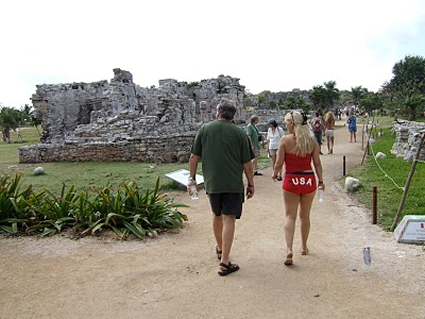How To Be An Ugly American
Article and photos by Robert Reid
1/2014

|
|
American tourists visiting Tulum, Mexico.
|
Seventeen years ago, something happened to me in India that turned me into an “Ugly American” for life. And I’m thankful for it.
Riding an overnight Udaipur-Delhi bus, my seatmate, a Rajasthani local, wordlessly took my Sony Walkman from my hands to play some of his tapes. Stunned, I steamed in silence, helplessly watching my battery life fade as he nodded his head to his chosen tunes. A half-hour later, he returned it without even a nod of “thanks.” I couldn’t believe the gall of the guy, but said nothing. Eventually, the sun set and I was caught off guard as a hot day turned into a near-freezing night. Seeing this, my neighbor extended his blanket across my seat, instinctively sharing the warmth. Again, without a word.
It’s the most powerful travel lesson I’ve learned in 20-some years of world travels. In some places of the world, when someone needs something — be it a blanket or a tape player — you just let them use it. It’s as simple as that. And though I didn’t stomp my feet or soliloquize about how that’s not the way things are done “back home,” this event helped me become an “Ugly American.”
That is, if you return to its original definition.
No phrase is more misunderstood than “Ugly American,” a dated stereotype that, to be honest, I’ve barely seen in action. Its source is a heavy-handed 1958 novel by William J Lederer and Eugene Burdick that tsk-tsks the brash, self-righteous diplomacy of the USA in Southeast Asia in the years before the Vietnam War.
But the book’s outcast, its hero, is the “Ugly American,” who neatly demonstrates an immortal creed for responsible travelers:
-
learn some of the language
-
stay in local areas (he lives in local neighborhoods, and without servants)
-
eat and buy local goods (not fancy imports)
-
take local transport (no chauffeurs or fancy air-conditioned rentals)
-
read up on local myths and history before you go
See a pattern? The original “Ugly American” is the ultimate “travel like a local.” Doing so not only keeps money where it’s most needed, but makes for the best travel. And it works wherever you go, be it Vladivostok, Quetzaltenango or Cleveland.
Recently at a café thumbing through my old copy of The Ugly American, I overheard a young woman nearby talking about out how to live abroad. She told a friend, “But you have to be careful where you go – most everyone hates Americans.”
I wonder where people get this stuff? It’s not from travel, at least not in my experience.
I find the American who pre-emptively assumes guilt by association (thus altering travel plans or — or worst of all — considers popping a Canadian Maple Leaf on their backpack) to be something of the flipside to the “Ugly American” stereotype. Meaning, equally as unaware as the loud cruise daytripper in Playa del Carmen, Mexico, who boasts that Taco Bell makes the better taco.
For starters, it’s not true. (And not just the tacos.) Americans open to what they find will be welcomed just about anywhere — and ought to take advantage of that. A survey by Pew Global Attitudes Project shows how most of the world’s view of the USA is still positive in most parts of the world in spite of a couple of unpopular Presidents.
Over the past couple decades, I’ve had the pleasure of living abroad (Vietnam, Australia, the UK) and traveled throughout the old Soviet bloc, Southeast Asia and Latin America. I’ve never hid where I’m from, and never been criticized or shunned for it either. In Siberia, I got hugs and horsemeat from a Marxist grandmother who showed off her embroidered Stalin pillows. A former North Vietnamese captain bear-hugged me in a cave-hospital that survived US bombs. A robed local in Omani invited me to drink tea and eat some “fresh Omani dates” and then took me on a shoreline walk where the conversation was always personal and friendly, nothing about the impending war with Iraq.
This is not about governments. Travel is at its best beyond politics, instead on the ground, face-to-face, punctuated with a lasting impact of personal connections across cultures.
Sometimes that leads to surprising finds.
Last year in France, a local in Florac insisted I try a famous local delicacy. And I had to hesitate when I heard about it. Seriously, it’s a big-time faux pas for an American in France to order a hamburger, right? But I reminded myself to follow the local lead, and — not realizing France’s gourmet scene is “swarming with hamburgers” lately
— went and ordered one, and was rewarded with a burger packed with fresh vegetables and personally introduced, with long-winded panache, by the chef. And advised to eat it with fork and knife.
The side? Not French or Freedom fries, but “chips,” as they call them in Britain.
I bring this up because the “Ugly American” of the book — whose name is Homer — would have eaten that burger. The reason is because he didn’t go abroad to dictate, or to hide. And he didn’t take himself too seriously either. He just immersed himself in places and let his experiences spring from the people. The locals. Including whatever they eat.
Most of us often travel that way. Those who instead pack the norms and expectations from home when they go abroad – be they American or otherwise – probably need a new name.
How about “bad at travel”?
Robert Reid has written a couple dozen Lonely Planet guidebooks, talked travel on TV shows like the Today Show and CNN Headline News, and writes regularly for National Geographic Traveler. This is his first article for a new monthly column for Transitions Abroad on “How to Enjoy the World.” He lives in Portland, Oregon.
|
